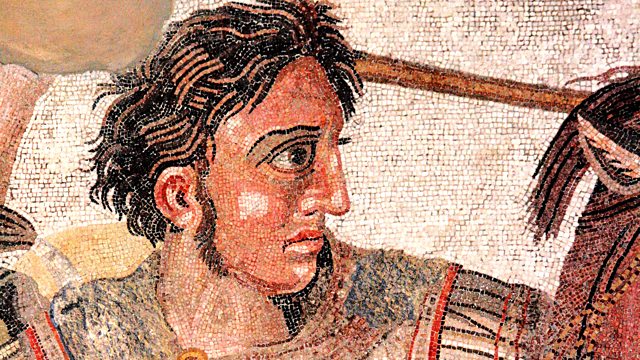Alexander the Great
Melvyn Bragg and guests discuss the life and legacy of Alexander the Great, king of Macedon and conqueror of the Persian Empire.
Alexander the Great is one of the most celebrated military commanders in history. Born into the Macedonian royal family in 356 BC, he gained control of Greece and went on to conquer the Persian Empire, defeating its powerful king, Darius III. At its peak, Alexander's empire covered modern Turkey, Syria, Egypt, Iran, Iraq, Afghanistan, Pakistan and part of India. As a result, Greek culture and language was spread into regions it had not penetrated before, and he is also remembered for founding a number of cities. Over the last 2,000 years, the legend of Alexander has grown and he has influenced numerous generals and politicians.
With:
Paul Cartledge
Emeritus Professor of Greek Culture and AG Leventis Senior Research Fellow at Clare College, University of Cambridge
Diana Spencer
Professor of Classics at the University of Birmingham
Rachel Mairs
Lecturer in Classics at the University of Reading
Producer: Victoria Brignell.
Last on
More episodes
Previous
LINKS AND FURTHER READING
听
READING LIST:
Arrian (ed. Betty Radice), The Campaigns of Alexander (Penguin Classics, 1971)
Elizabeth Carney and Daniel Ogden (eds.), Philip II and Alexander the Great: Father and Son, Lives and Afterlives (Oxford University Press, 2010)
Paul Cartledge, Alexander the Great: the Truth behind the Myth (Pan Macmillan, 2013)
Paul Cartledge & Fiona Rose Greenland (eds.), Responses to Oliver Stone鈥檚 Alexander: Film, History and Cultural Studies (University of Wisconsin Press, 2010)
K. Dahmen, The Legend of Alexander the Great on Greek and Roman Coins (Routledge, 2007)
Andrew Feldherr (ed.), The Cambridge Companion to the Roman Historians (Cambridge University Press, 2009), particularly 鈥楤arbarians I: Quintus Curtius鈥� and other Roman Historians鈥� Reception of Alexander鈥� by E. Baynham
Robin Lane Fox, The Search for Alexander (Little Brown and Company, 1980)
Robin Lane Fox, The Making of Alexander: The Official Guide to the Epic Film Alexander (R & L, 2004)
Waldemar Heckel and Lawrence Tritle (eds.), Alexander the Great: A New History (Wiley-Blackwell, 2009)
Rachel Mairs, The Hellenistic Far East: Archaeology, Language and Identity in Greek Central Asia (University of California Press, 2014)
Plutarch (trans. Timothy Duff and Ian Scott-Kilvert), The Age of Alexander (Penguin Classics, 2012)听
Diana Spencer, The Roman Alexander: Reading a Cultural Myth (Liverpool University Press, 2002)
Mary Renault, The Alexander Trilogy (Penguin Books, 1984)
James Romm (ed.), The Landmark Arrian: The Campaigns of Alexander the Great (Anchor Books, 2012)
Quintus Curtius Rufus (ed. Waldemar Heckel), The History of Alexander (Penguin Classics, 1984)
Andrew Stewart, Faces of Power: Alexander鈥檚 Image and Hellenistic Politics (University of California Press, 1994)
Richard Stoneman, Alexander the Great: A Life in Legend (Yale University Press, 2010)
Richard Stoneman, Kyle Erickson, and Ian Netton (eds.), The Alexander Romance in Persia and the East (Barkhuis, 2012)
Ian Worthington (ed.), Alexander the Great: A Reader (Routledge, 2011)
Z. David Zuwiyya (ed.), A Companion to Alexander Literature in the Middle Ages (Brill, 2011)
Credits
| Role | Contributor |
|---|---|
| Presenter | Melvyn Bragg |
| Interviewed Guest | Paul Cartledge |
| Interviewed Guest | Diana Spencer |
| Interviewed Guest | Rachel Mairs |
| Producer | Victoria Brignell |
Broadcasts
- Thu 1 Oct 2015 09:00成人快手 Radio 4
- Thu 1 Oct 2015 21:30成人快手 Radio 4
Featured in...
![]()
Ancient Greece—In Our Time
Browse the Ancient Greece era within the In Our Time archive.
![]()
History—In Our Time
Historical themes, events and key individuals from Akhenaten to Xenophon.
In Our Time podcasts
Download programmes from the huge In Our Time archive.
The In Our Time Listeners' Top 10
If you鈥檙e new to In Our Time, this is a good place to start.
Arts and Ideas podcast
Download the best of Radio 3's Free Thinking programme.
Podcast
-
![]()
In Our Time
Melvyn Bragg and guests discuss the ideas, people and events that have shaped our world.



